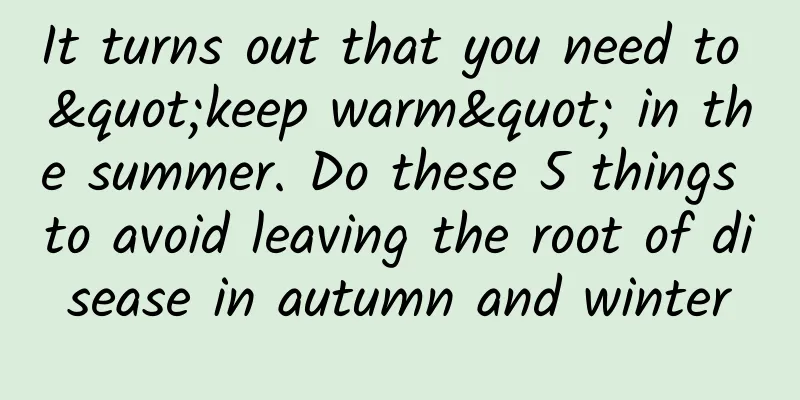As the saying goes, "No amount of money can buy slimness in old age." Is this true?

|
Author: Sun Xiaohong, Chief Physician, Peking Union Medical College Hospital Reviewer: Qu Xuan, deputy chief physician, Peking Union Medical College Hospital In recent years, "thin" has almost become synonymous with health. As we all know, obesity is closely related to chronic diseases such as high blood pressure, high blood sugar, and high blood lipids. Especially some elderly people are prone to various chronic diseases, so everyone hopes that they can be "thinner" or "thinner still." Some elderly people even try to lose weight by dieting or following a vegan diet, but this is actually not advisable. 1. What are the risks of dieting or following a vegan diet for the elderly? Now that living conditions are better, many elderly people will deliberately eat vegetarian food or avoid eating foods with high protein content. In fact, the risks of doing so are still relatively high. Insufficient protein intake can cause malnutrition, and one of the most serious consequences is sarcopenia. Sarcopenia may eventually lead to weakness and disability, and some elderly people may even fall. For example, the most common fall for the elderly is when they are not sitting firmly, which can lead to a fall, hip fracture or femoral neck fracture. After being bedridden due to a fracture, aspiration pneumonia may occur. This will lead to falls, bed rest, lung infections, poor recovery from lung infections, and more falls, creating a vicious cycle. Figure 1 Original copyright image, no permission to reprint In addition, if the elderly are malnourished and suffer from certain acute diseases at the same time, their later recovery may also be affected. 2. What changes warn that the elderly may be at risk of malnutrition? If elderly people want to see whether they are at risk of malnutrition, they should first pay attention to whether they have lost weight recently. The easiest thing to monitor for the elderly is whether they have lost weight, especially in the last three or six months. If the weight loss exceeds 5%, it is time to pay attention. If it exceeds 10%, it indicates that there is already a serious malnutrition. The second thing is to pay attention to your recent appetite and whether you eat less than before. Also, relatives and friends may sometimes ask you why you have lost weight recently. This may be a time for concern, as weight loss may indicate a potential serious illness. As long as you feel that you have lost weight, you should seek medical attention immediately and let the doctor help you find out the reason behind the weight loss, whether there are any serious problems, etc. 3. Can the elderly determine their risk of malnutrition through their body mass index (BMI)? When the elderly judge whether they are malnourished, a more intuitive data is the body mass index, which is calculated by dividing the weight (kilograms) by the square of the height (meters). It should be noted that there is an age limit for BMI. For example, people over 70 may be shorter due to osteoporosis, so the indicators set for people under 70 and over 70 are different. For example, for Asians, the lowest normal BMI for people under 70 is 18.5, while the lowest normal BMI for people over 70 is 22. Figure 2 Original copyright image, no permission to reprint Another more intuitive data is to continuously monitor weight and see the recent weight loss rate. For example, compared with the original weight, if it drops by ≥10% within 6 months or ≥5% within 3 months, it may be malnutrition. Or if the weight loss exceeds 3 kg, you should also be alert to malnutrition. This kind of monitoring and calculation can usually be done by ordinary elderly people at home, which is relatively simple and convenient. 4. If an elderly person is suspected of suffering from malnutrition, which department should he/she go to? Generally, if the elderly lose weight, they may visit the gastroenterology department or the geriatrics department. Because there are many publicity about health knowledge for the elderly, the elderly nowadays have a strong awareness of their own health. For example, some elderly people come to see a doctor and directly say, "I have lost weight, let's see if I have malnutrition, or I have many chronic diseases, and I hope the geriatric department can give me health guidance." Sometimes they also go to the nutrition department. Some elderly people feel that they are not eating well and hope that the nutrition department can give them guidance on how to eat properly. Sometimes the geriatrics department and the nutrition department will communicate with each other. For example, if a patient goes to the geriatrics department for treatment, they may give him some guidance, but if the elderly person's diet requires more professional guidance, they will also be recommended to go to the nutrition department for a check-up. Conversely, when the nutrition department provides dietary guidance to the elderly, if they find that the elderly may have other problems, they will also recommend that they visit the geriatric department. In fact, they are all connected. Therefore, if elderly people lose weight, it is okay to see a gastroenterologist, nutritionist, or geriatrician, as long as they seek medical treatment in a timely manner. |
>>: Understanding gallbladder distress signals: These symptoms may indicate gallstones
Recommend
Who is suitable for drinking white tea? Can I still drink the expired unopened white tea?
White tea is the closest to the natural state amo...
Is it really bad for pregnant women to eat bananas?
Banana is one of the fruits that most of our read...
Causes of cervical erosion
Cervical erosion is a very common disease, which ...
My lower body is a little itchy, what's going on?
If there is any abnormal condition in the body, i...
How many megabits does broadband Internet speed usually reach? How to set up a router for mobile broadband
Broadband, in basic electronics and electronic co...
What is the origin and food of the Mid-Autumn Festival? What are the traditions of the Mid-Autumn Festival?
Eating mooncakes is an essential custom for celebr...
How often is menstruation normal?
Menstruation comes once a month, but many women d...
What foods should I eat for breast fibroids
Breast fibroid is a rare tumor that occurs freque...
Why does pubic hair fall out easily?
Both men and women have pubic hair in their priva...
Mild abdominal pain in early pregnancy
Every female friend will have some symptoms durin...
How old can babies drink milk powder? How to choose milk powder that is easy to absorb?
Babies who are fed with formula milk and families...
How to make fried dough sticks and what should be paid attention to when making fried dough sticks
During the epidemic, my friends stayed at home, a...
Why does the gloxinia flower not bloom? How can the gloxinia flower bloom?
Gloxinia is a common flower plant in life. Becaus...
What are the causes and types of diseases of heavy leucorrhea?
Leucorrhea is a vaginal secretion that every woma...
Precautions for postpartum care during summer
Many women do not know they are pregnant when the...









